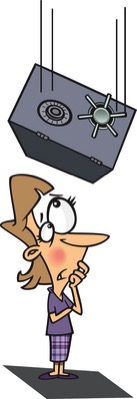Changing Your Past
 The Grasshopper offered this piece of wisdom about 4 years ago: “You can’t change your past, only update your response to it.” Here’s the back story:
The Grasshopper offered this piece of wisdom about 4 years ago: “You can’t change your past, only update your response to it.” Here’s the back story:
What if you could touch up parts of your past and see them in a new light, wouldn’t that be helpful? It can be done even if you’re a lousy painter.
I learned a long time ago that we often respond not to “here and now” but to “there and then.”
How often have you had an inappropriate or over-the-top response to something trivial? Chances are it had nothing to do with here and now, but with the events of there and then.
I heard Dr. Robert Anthony back in 1975 say something that has stuck with me since: “You’re never upset for the reason you think.” “Never” may be too strong a word but the concept is accurate more often than not.
We respond to the conditioning that happened there and then even though our response has nothing to do with the current stimulus that’s happening here and now.
The key is to begin recognizing that your response often has nothing to do with the current stimulus you are reacting to.
Reminds me of a story that was all over the media a few years ago . . .
News anchor, Katie Couric, as the story goes, was slapping her news editor repeatedly on the arm for using a word she detested –”Sputum.” “I sort of slapped him around” Couric said to New York magazine. “I got mad at him and said, ‘You can’t do this to me. You have to tell me when you’re going to use a word like that.'” She went on to say, “I was aggravated, there’s no question about that.”
She didn’t come out of the womb with a reaction to the word “Sputum,” it was conditioned along the way. It was also highly reported on that she cared for her gravely ill husband until his death. One could easily hallucinate that her response to “Sputum” wasn’t about the story on tuberculosis she was about to report on, but rather episodes she had with her severely ill husband.
Whatever caused her conditioned response may remain a mystery, but it wasn’t the here and now story. Her response was about there and then.
What are you responding to as though it’s happening now, but is really about there and then? More stuff than you think.
So how do you retouch that old picture so it gets updated? Use a technique I learned from a dearly departed wizard of hypnosis Dr. Dave Dobson.
Find something from your past that you are still reacting to as though it’s happening now. Go back to that time in your mind, but go back as the person you are now. You have more insight now than you did then. It’s a more mature you going back to visit a scared, confused you.
The objective of this mild fantasy is to reassure the younger you that everything will be all right. Let them know you have survived that scary time and that you are going to help them forward. You are not painting over the picture; you are retouching their response to it by assuring your younger self that you are there for them every step of the way. Let them know they are not alone.
The result of this simple exercise is a more peaceful you, today. You can do the exercise a number of times and what you will find is that each time you do it, the “there and then” event releases its hold on you so you don’t respond as though it’s going on “here and now.”
You are not changing your past, just updating your response to it.
Retouching your life has a touching effect.
All the best,
John
Be Sociable, Share!

 There may be a weaker, information seeking word than “Why” but, if so, I’m not aware of it.
There may be a weaker, information seeking word than “Why” but, if so, I’m not aware of it. There’s something I’m totally proficient at that I don’t need to practice anymore. I suspect you are too, yet we keep practicing.
There’s something I’m totally proficient at that I don’t need to practice anymore. I suspect you are too, yet we keep practicing. The Grasshopper offered this helpful tidbit yesterday: “Most people with major problems need the help they don’t want.”
The Grasshopper offered this helpful tidbit yesterday: “Most people with major problems need the help they don’t want.” I have never heard anyone say, “I was at the wrong place at the right time.” It got me to wondering if this location scenario exists. I believe it does.
I have never heard anyone say, “I was at the wrong place at the right time.” It got me to wondering if this location scenario exists. I believe it does. I tripped over an old Grasshopper Note that reminded me that it’s often quite useful to make the transition from one definition of a concept to another to get the broader perspective and benefit the new description delivers.
I tripped over an old Grasshopper Note that reminded me that it’s often quite useful to make the transition from one definition of a concept to another to get the broader perspective and benefit the new description delivers. It seems to me that passion is like speed in football, either you have it or you don’t; it’s not something you can learn.
It seems to me that passion is like speed in football, either you have it or you don’t; it’s not something you can learn.